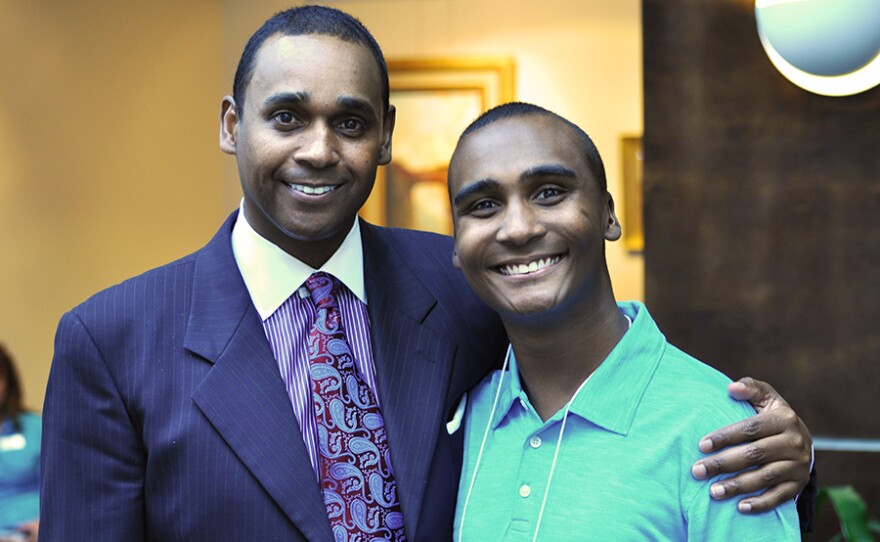Dwayne Ballen spent the early years of his childrens’ lives jetting between the East and West Coasts. He worked as a sportscaster in Los Angeles, but his family lived in the Triangle. When his eldest son Julian was diagnosed with autism, everything changed.
Ballen had a hard time coming to terms with his son’s diagnosis. He points to male hubris and hyper-masculinity as the main reasons for his struggle, but grief also played a part. At the time Ballen did not know many other fathers of children with autism, and this experience of isolation is one of many reflections he hopes to share this weekend at the first-ever UNC Autism Fathers Conference.
The event aims to support fathers of kids with autism through community and honest conversation, changing the tide of decades of research and cultural focus on the relationship between children with autism and their mothers. Host Frank Stasio talks to Ballen about his story, documented in the book “Journey with Julian” (Strebor Books/2013).
Also joining the conversation is Peter Bell, the CEO and president of Ascendigo, a nonprofit dedicated to helping people on the spectrum through recreation. His son Tyler was diagnosed with autism when he was 3, and Bell has spent the past 15 years advocating for the ASD community. Bell will deliver the keynote at the UNC Autism Research Center’s conference on Saturday, Sept. 17.
Interview Highlights
Dwayne Ballen on how his wife pushed him to accept their son's autism diagnosis:
She kept giving me literature which I kept putting to the side. And one day, she just stopped me and she said, "Look, you do understand that he doesn't do this to upset you. This is where we are, this is who he is. Now you need to become a part of this, or you're going to miss it all." And it was like this clarion call that she issued to me. And I realized, and I started thinking, I said, 'Well, you know, I have got to get involved.' And it because I couldn't access his world at all. And he was not very verbal. And I just didn't, it did not make sense to me, Frank. So finally, you know, we started going to sessions, and I started learning more about it. And I have become very close to Julian, I've learned a lot. It is a process that evolves, you don't come to it quickly. And I realized that a lot of men were like me, they just...because of something they couldn't correct right away.
Peter Bell on why it's important to talk about a father's role in raising a child with autism:
But for the most part, you know, many people really haven't paid attention to the role that the father plays. And I think we're now starting to realize how important it is for children to have a family that has everyone working on all cylinders, to help support that child. And you know, it goes beyond just a child with autism. It goes, you know, to any child. But I think it's great that the leaders at UNC and this community are putting some attention to making sure that fathers feel supported and understand the important role that they can play in helping their child have a successful life while they're living with autism.
Dwayne Ballen on why the conference is important to the autism community:
I travel around the country when I go, I'm really amazed at the lack of fathers and the stories that mothers come up and tell me. It's heartbreaking when a mother comes up to you and says, "He just left. He didn't know what to do. He just left us." So that's...you don't want to hear that. So the idea of the conference is that if there's any way we can reach you, and make you feel like it's okay to have misgivings. And it's okay to have questions, but you're not being judged. That's what this is. We want you to walk away from this feeling connected and that you have lifelines that you can call upon.





